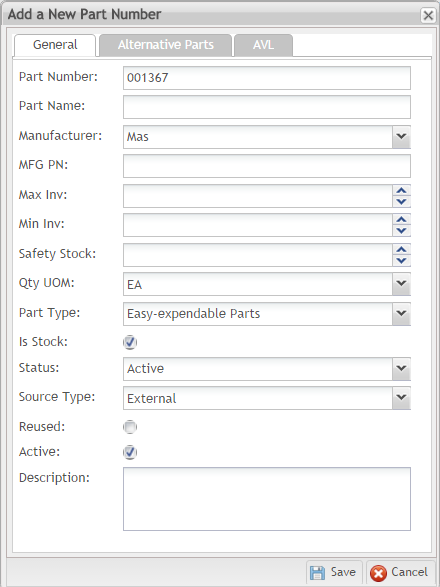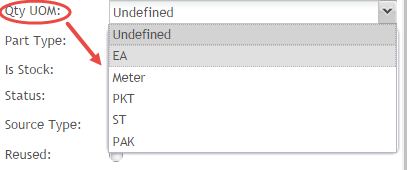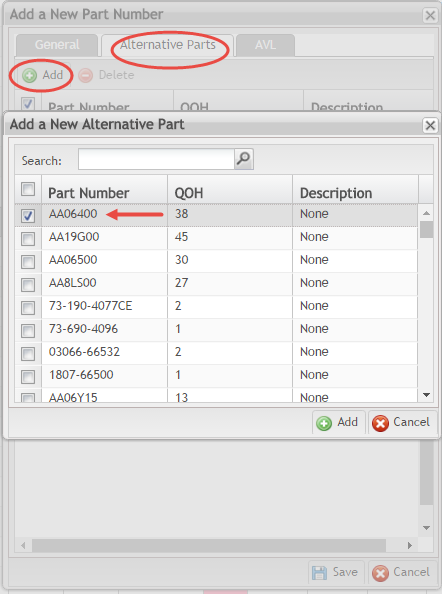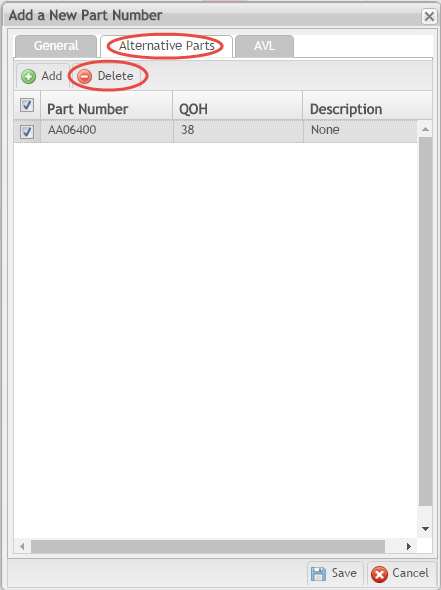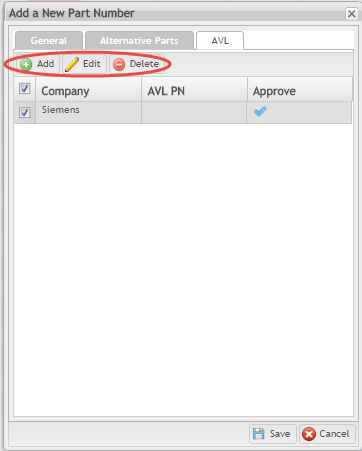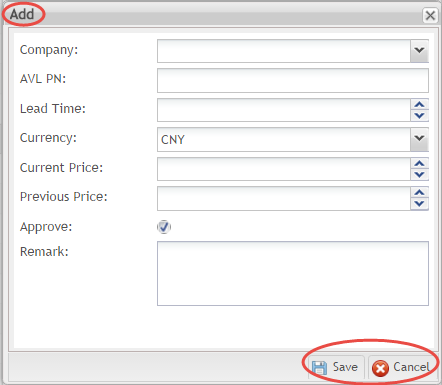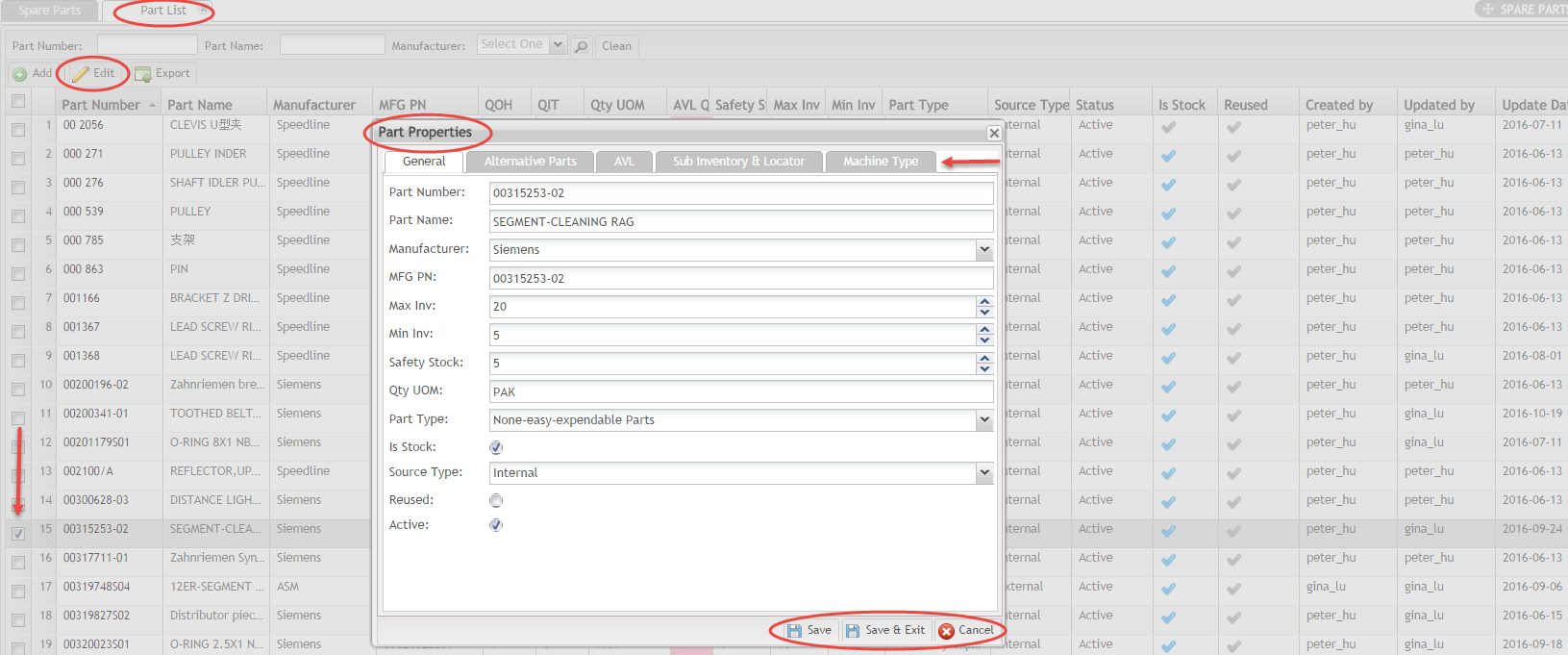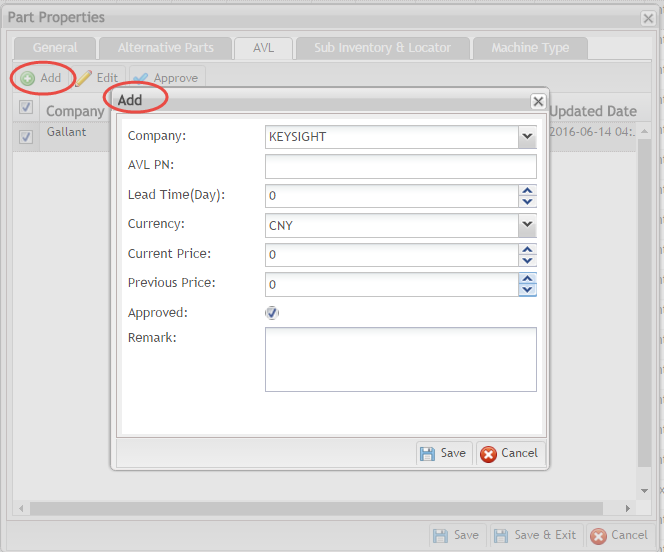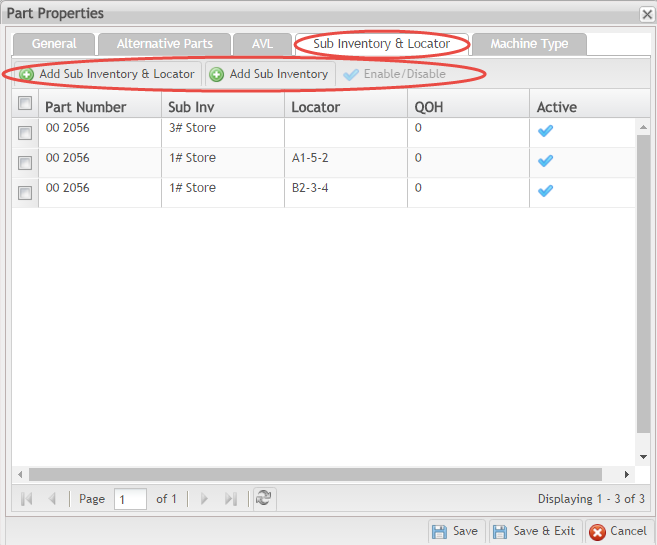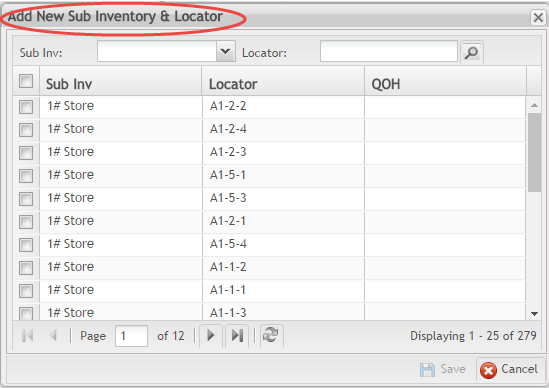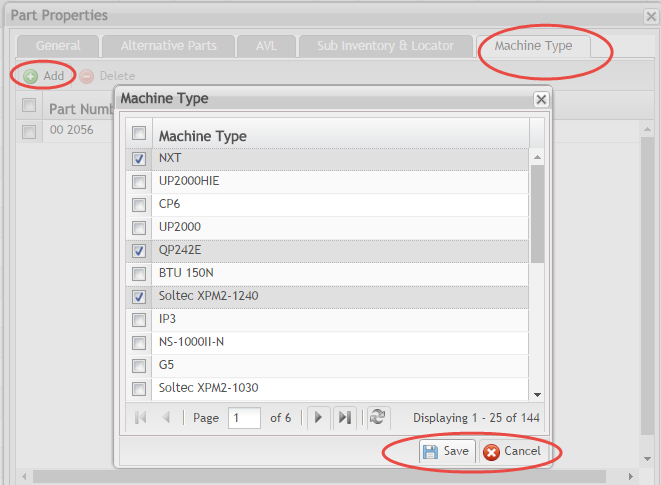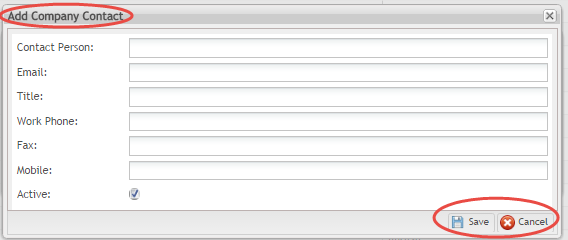Difference between revisions of "SOP-42Q-MES0075 CMMS Spare Parts"
| Line 516: | Line 516: | ||
| − | === Receive Parts Submodule<br> === | + | === Receive Parts Submodule<br> === |
Within the '''Receive Parts''' submodule users receive deliveries and increase cycle counts. | Within the '''Receive Parts''' submodule users receive deliveries and increase cycle counts. | ||
| − | '''Figure 31: Receive Parts Icon'''<br>[[Image: | + | '''Figure 31: Receive Parts Icon'''<br>[[Image:Receive Parts Submodule Icon.png]]<br><br> |
<br> | <br> | ||
| + | Within '''Receive Parts''', users can '''search/filter''' the part listing; '''add''' received parts; '''edit''' received parts; and '''export''' received part information. | ||
| + | |||
| + | '''Figure 32: Receive Parts Filtering Option''' | ||
== Document Revision History == | == Document Revision History == | ||
Revision as of 13:58, 1 May 2017
42Q Home > Production > CMMS Spare Parts
This edition applies to MES15 Portal 1.0 and all subsequent releases and modifications until otherwise indicated in new revisions.
Contents
- 1 Spare Parts
- 1.1 Spare Parts Submodule Icons
- 1.2 Part List Submodule
- 1.2.1 Search/Filter Part List
- 1.2.2 Add a Part
- 1.2.3 Edit Part List
- 1.2.4 Export Part List
- 1.3 Company Submodule
- 1.4 Receive Parts Submodule
- 2 Document Revision History
Spare Parts
The Spare Parts portal provides a comprehensive tracking system to manage all machine parts in a manufacturing plant’s inventory. Administrators and operators receive, issue, or return parts; maintain warehouse stock; and manage vendor information.
1. There are 14 submodules located within Spare Parts:
- Part List
- Company
- Receive Parts
- Issue Parts
- Return Parts
- Adjust Parts
- Sub Inventory
- Scrap Parts
- Reuse Parts
- Cycle Count
- Inventory View
- Transfer Parts
- Transaction Logs
- Purchase Request
2. To navigate: Production > CMMS Spare Parts
Figure 1: Navigate to Spare Parts Module
Spare Parts Submodule Icons
User-friendly icons help users navigate through the Spare Parts portal.
Figure 2: Spare Parts Icons
Part List Submodule
Within the Part List submodule, users can view all parts pertaining to site equipment and machinery, and perform functions related to those parts.
Figure 3: Part List Submodule Icon
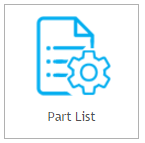
1. Users can complete the following actions in the Part List submodule:
- Search/Filter part entries
- Add parts
- Edit parts
- Export parts
2. NOTE: Abbreviations located within this module are defined as follows:
- QOH: Quantity on Hand
- QIT: Quantity in Transit
- Qty UOM: Quantity Unit of Measure: UOMs enable plants to quantify and track inventory items according to their packaging. For example, singular parts are listed as EA (each), while parts that remain packaged together are noted as PAK. Refer to the Glossary of Terms within this work instruction for more details.
Search/Filter Part List
Users can search and filter the list of parts that are displayed in the list.
1. Users may search for specific parts according to the following criteria, located on the top menu bar of the Part List Submodule:
- Part Number: Enter a partial or complete Part Number.
- Part Name: Enter a partial or complete Part Name.
- Manufacturer: Select a Manufacturer from the drop-down list.
2. Select filtering options.
3. Select the search icon (e.g. magnifying glass).
Figure 4: Part List Filtering Options
Figure 5: Part List Screen Example
3. The figure above shows a typical part list and its subsequent categories.
4. NOTE: The Column “AVL Qty” (Available Quantity) appears red. Because this information is critical to busy plant administrators, it is highlighted for easy reference.
When Part Quantities fell below the Safety Stock number, the field appears yellow; this provides a visual reminder to operators that parts are due to be ordered (see Figure 5a, below).
Figure 5a: Part List Safety Stock Alert
Add a Part
To add a part to the Part List:
1. Select Add from the Part List menu. The Add a New Part Number pop-up window displays, which is comprised of three tabs: General, Alternative Parts, and AVL (Available).
Add Part List: General Tab
Figure 6: Add a New Part Number Window
Within the General tab, complete the fields provided:
- Enter a Part Number.
- Enter a Part Name.
- Enter a Manufacturer. NOTE: This field lists all available companies in a drop-down menu format. To add, edit, or delete a company from this list, return to the Spare Parts main screen and select the Company submodule (Production > CMMS Spare Parts > Company).
- Enter MFG PN. This field denotes the part number - that is, the part ID for the manufacturer.
- Enter Max Inv. This field denotes the maximum inventory. Max value should be higher or equal than minimum and minimum should be higher or equal than safe.
- Enter Min Inv. This field denotes the minimum inventory.
- Enter Safe Inv. This field denotes the safety stock. NOTE: Safe inventory must exceed the value entered in minimum inventory (see Figure: Safety Stock, below).
Figure 7: Safety Stock
- Enter QTY UOM from the drop-down list. This field denotes the unit of measure for the part, according to how the part is packaged and counted. Options include: Undefined; EA; Meter; PKT; ST; PAK
Figure 8: QTY UOM Drop-down Menu
- Enter Part Type from the drop-down list. Select whether the part is "Easy-expendable" or "Non-easy-expendable." Default is Easy-expendable.
- Check whether part number Is Stock
- Select Status from the drop-down list. The user may select from the options: Active, Inactive, or Obsolete.
- Select Source Type from the drop-down list. Options include: Internal or External. Default value is External.
- Check if Reused.
- Check if Active.
- Enter a Description. This field is Optional.All other fields are Mandatory.
Add Part List: Alternative Parts Tab
Under the Alternative Parts tab, users can add or delete alternative parts. The main purpose of this feature is to associate parts with alternative part choices. NOTE: These actions refer to the selection of fungible parts.
Add Alternative Parts
- Select Add from the Alternative Parts menu. The Add a New Alternative Part pop-up window appears (see Figure, below).
- Type a part number in the search bar or select an item from the list.
- Select Add to finish or Cancel to abort.
Figure 9: Add a New Alternative Part
Delete Alternative Parts
Figure 10: Delete Alternative Parts
Add Part List: AVL (Approved Vendor List)
Under the AVL (Approved Vendor List) tab, users may add, edit, or delete approved vendor information.
Figure 11: AVL (Approved Vendor List) Tab Functions
Add an AVL (Approved Vendor List)
1. Select Add from the menu. The Add pop-up window displays (see Figure 12, below).
2. Complete the fields provided:
- Select a Company from the drop-down list.
- Enter an AVL PN (Approved Vendor List Part Number).
- Enter a Lead Time. NOTE: Lead Time refers to the delivery time (in days) of the given part.
- Select Currency from the drop-down list (according to country)
- Enter Currency Price.
- Enter a Previous Price.
- Check to Approve.
- Enter a Remark.
3. Select Save to finish or Cancel to abort.
Figure 12: Add an AVL (Approved Vendor List)
Edit an AVL (approved Vendor List)
1. To edit an AVL (Approved Vendor List), select an AVL from the list and choose Edit. The Edit pop-up menu appears.
2. The user may edit any of the fields provided:
- Company
- AVL (Approved Vendor List) PN
- Lead Time (Day)
- Currency
- Current Price
- Previous Price
- Approve
- Remark
3. Select Save to finish or Cancel to abort.
Delete an AVL (Approved Vendor List)
1. To delete an AVL, select an AVL from the list and choose Delete. This removes the AVL from the list.
Figure 13: Delete an AVL (Approved Vendor List)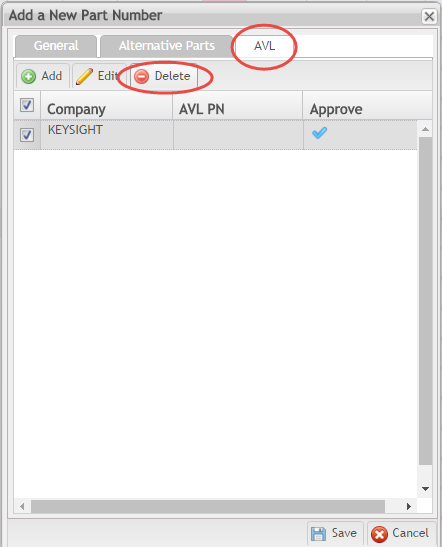
Edit Part List
Users can edit part lists from the Part List sub-module page. To edit a part list:
Select a part from the list. The Edit function becomes available.
Select Edit. The Part Properties pop-up window appears which is comprised of five tabs: General, Alternative Parts, AVL; Sub Inventory & Locator; and Machine Type.
Figure 15: Part Properties Window
Part Properties: General Tab
Under the General tab, users may edit the following fields for the selected part:
- Part Number
- Part Name
- Manufacturer
- MFG PN
- Max Inv
- Min Inv
- Safe Inv
- Qty UOM
- Part Type
- Is Stock
- Source Type
- Reused
- Active
NOTE: The fields mirror those populated in the Add Part List General Tab. Refer above for detailed explanation of the fields.
Part Properties: Alternative Parts Tab
Under the Alternative Parts tab, users can add and delete alternative parts assigned to a given part.
Add an Alternative Part
1. Select Add from the Alternative Parts menu.
2. Type the Part number in the text provided and select the search icon (e.g. magnifying glass); or scroll the list to select the alternative part number.
3. Select the Add icon to complete.
Delete an Alternative Part
1. Select a part from the Alternative Parts list. The Delete function becomes available.
2. Select Delete to remove the part from the list.
Figure 16: Alternative Parts Tab

Part Properties: AVL (Approved Vendor List) Tab
Within the AVL tab, users can add, edit, and approve available part numbers (AVLs) for the selected part.
Figure 17: AVL Tab
Add an AVL (Approved Vendor List):
1. Select Add from the AVL menu. The Add pop-up window appears (see Figure 18).
Figure 18: Add AVL (Approved Vendor List) Tab
2. Complete the information for the fields provided:
- Select a Company Name from the drop-down list.
- Enter Lead Time.
- Select Currency according to country from the drop-down list.
- Enter Current Price.
- Enter Previous Price.
- Check if Approved.
- Enter a Remark about the AVL.
- Select Save to finish; or Cancel to abort.
NOTE: The fields will mirror those populated in the Add Parts: AVL Tab
Edit an AVL (Approved Vendor List):
- Select an AVL from the list. The Edit function activates (see Figure 17).
- Select Edit. The Edit pop-up window displays.
- Edit any of the provided fields as needed.
- Select Save to finish or Cancel to abort.
Approve an AVL (Approved Vendor List):
- Select an AVL from the list. The Approve function activates, as noted by a blue checkmark (see Figure 17).
- Select Approve to approve the AVL for the selected part.
- NOTE: If the AVL was already approved, this action will render the AVL as unapproved. Approved AVLs are denoted with a blue checkmark under the AVL list; unapproved AVLs are denoted with a grey checkmark.
Part Properties: Sub Inventory & Locator Tab
A sub inventory is a location where parts are stored (e.g., a warehouse). Locators are the shelf ID within a sub inventory. Plants may opt to omit the locator in the description. Plants often make this choice in situations where there are so many of a given part that plant operators do not need a shelf ID to locate the part. In such cases, only the sub inventory field is selected.
Within this tab, users can add, enable, or disable a sub inventory and/or locator.
Figure 19: Sub Inventory & Locator Tab
Add a Sub Inventory and Locator
- Select Add Sub Inventory & Locator from the menu. This opens the Add New Sub Inventory & Locator pop-up window.
- Select one or more items to add.
- Select Save to finish or Cancel to abort.
Figure 20: Add New Sub Inventory and Locator
Enable/Disable a Sub Inventory & Locator
- Select an item from the Sub Inventory & Locator list. The Enable/Disable function activates.
- Select Enable/Disable. This will enable (i.e., make active) any item that was previously disabled, and disable any item that was previously enabled. Enabled items are denoted by a blue checkmark while disabled items are denoted with a grey checkmark.
Part Properties: Machine Type Tab
Under the Machine Type Tab, users can add and delete machine types assigned to a part number.
Add a Machine Type
- Select Add from the menu tab.
- Select the machine type from the list that populates in the pop-up window (see Figure 21, below).
Figure 21: Add Machine Type
Delete a Machine Type
- Select the machine type by activating the checkbox next to its name.
- Select Delete.
- The machine type is now removed from the given part.
Figure 22: Delete Machine Type
Export Part List
To export the part list into an external file:
- Select Export from the Part List menu.
- The part list automatically downloads as a .csv file onto the local drive.
- Name, save, print, or share the .csv file as desired.
Figure 23: Export Part List
Company Submodule
In the company sub-module page, users can search, add, edit, enable/disable, and export vendor and manufacturer company information.
Figure 24: Company Submodule Icon![]()
Search/Filter Company
- To search the company list:
- Enter a partial or complete company name into the search field at the top of the company sub-module page and select the search icon (e.g. magnifying glass).
- The result of the search parameters entered will display.
Add Company
From the Company List page select Add. The Add Company pop-up window appears, which is comprised of three tabs: Company, Company Address List, and Company Contact List.
Add Company: Company Tab
- Enter the following company information:
- Company ID
- Company Name:
- Category
- Active [checkbox]
Figure 25: Add Company: Company Tab
Add Company: Company Address List Tab
Within the Company Address List tab, users may add, edit, or delete address information:
Add A Company Address
1. Select Add. The Add Company Address pop-up window appears.
2. Complete the fields provided:
- Address
- Zip/Code
- State
- City
- County
3. Select Save to finish or Cancel to abort.
Figure 26: Add Company Address 
Edit Company Address List
- Select an address from theCompany Address List to activate the Edit function.
- Select Edit. The Edit Company Address pop-up window appears.
- Edit any of the fields as needed.
- Select Save to complete or Cancel to abort.
Delete Company Address List
- Select an address from the Company Address List to activate the delete function.
- Select Delete. The selected address in now removed from the Company Address List.
Figure 27: Edit/Delete Company Address List
Add Company: Company Contact List Tab
Under the Company Contact List, the user may add, edit, or enable/disable contacts.
Add Company Contacts
1. Select Add from the Company Contact List tab. The Add Company Contact pop-up window appears.
2. Complete the fields provided:
- Contact Person
- Email
- Title
- Work Phone
- Fax
- Mobile
- Active [checkbox]
3. Select Save to complete or Cancelto abort.
Figure 28: Add Company Contacts
Edit/Enable/Disable Company Contact List
- Select Edit from the Company Contact List menu. The Edit Company Contact pop-up window appears.
- Edit any of the fields as needed.
- Select Save to complete or Cancel to abort.
- To Enable/Disable Company Contacts, select a company contact from the Company Contact List. The Enable/Disable function displays.
- Select the Enable/Disable icon to change company contact list status. A blue checkmark indicates an active (enabled) status; grey checkmarks indicate inactive (disabled) status.
Figure 29: Edit/Enable/Disable Company Contact List

Figure 30: Edit/Enable/Disable/Export Company
Edit a Company
From the Company List sub-module page select a company from the list. The Edit function now displays.
Select Edit. The Edit Company pop-up window appears. The Edit Company pop-up window includes three tabs: Company, Company Address List, and Company Contact List.
NOTE: The Edit Company tab includes the same information fields available in the Add Company tab.
Edit a Company: Company Tab
Under the Company tab, edit any of the provided fields as needed:
- Company ID
- Company Name
- Category
- Active [checkbox]
Edit a Company: Company Address List Tab
- Under the Company Address List tab, users may add, edit, or delete company address listings.
NOTE: Please refer to the Add Company Address List instructions above for additional information about the Company Address List tab.
Edit Company: Company Contact List Tab
- Under the Company Contact List tab, users may add, edit, or disable/enable company contacts as needed.
NOTE: Please refer to the Add Company Contact List instructions above for additional information about the Company Contact List tab.
Enable/Disable a Company
To enable or disable a company from the Company sub-module page:
- Select a company from the Company List. The Enable/Disable function now displays.
- Select Enable/Disable. This enables the selected company if it was previously disabled, and disables the company if it was previously enabled.
- Enabled companies are noted by a blue checkmark. Disabled companies are noted with a grey checkmark.
Export Company information
Users can export company information onto a .csv file to save, print, or share. To export:
- Select the company by activating the checkmark next to its listing.
- Select the Export icon.
- A .csv file automatically downloads onto the user’s local drive.
- Open the .csv file
- Users may rename, save, print, or share the file as desired.
Receive Parts Submodule
Within the Receive Parts submodule users receive deliveries and increase cycle counts.
Within Receive Parts, users can search/filter the part listing; add received parts; edit received parts; and export received part information.
Figure 32: Receive Parts Filtering Option
Document Revision History
| Date | Author | Title | Version | Change Reference |
| 09/09/15 | Elaine Fonaro | Technical Writer | v 1.0 | This is the first revision of CMMS Spare Part for Cirrus |
| 04/26/16 | Elaine Fonaro | Technical Writer | v 1.0 | Converted to 42Q |
| 07/25/16 | Molly Kitts | Technical Writer Intern | v 1.0 | Converted to Google Docs |




